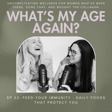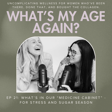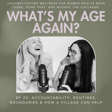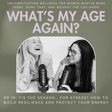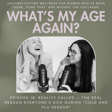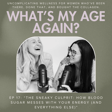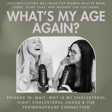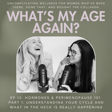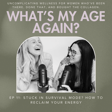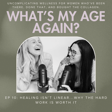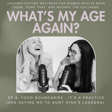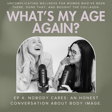Introduction to 'What's My Age Again'
00:00:00
Speaker
Welcome to What's My Age Again, the realest podcast for women who are done chasing trends and ready to feel empowered. Hi, I'm Kim. And I'm Tanya, holistic nutritionists and childhood best friends who've been there, done that, and bought the collagen.
00:00:16
Speaker
more than once. Each week we provide actionable steps that you can start today to help you thrive through every decade to come. We're cutting through the wellness noise to bring you honest conversations about aging, hormones, health, beauty, mindset, and everything in between.
Mission: Embracing Aging Gracefully
00:00:33
Speaker
You see, we're also on a mission to age gracefully one WTF moment at a time, backed by research and real life. We're here to share what actually works, what's a waste of time, and how to truly thrive through the messy, magical midlife transition.
00:00:49
Speaker
We're so happy you're here. Let's dive in. Hey, everybody. Welcome back to the podcast.
Reflecting on Previous Episode's Abrupt Ending
00:00:57
Speaker
Kim, how are you doing? Hi, everyone. Welcome back to What's My Age again.
00:01:01
Speaker
hi Tanya. I'm excited for today. Part two. Here we go. We told you we were going to bring you part two back to back. And now that I listened to and the end of part one, I was like, well, that was a little awkward, Tanya. That was an abrupt ending, but wasn't. That was totally my fault. I take ownership of that one.
00:01:20
Speaker
It wasn't your fault though, Kim. It was, I was just about to say it was a necessary ending because me and Kim, We just had so much to say. We thought we had it compacted enough that, you know what mean? Half an hour enough. half an hour wasn't enough. No.
00:01:36
Speaker
So that's why the abrupt ending, a little bit awkward, but it's real life. So we are going to start right now and we're going to pick up right where we left off doing a little recap.
Importance of Listening to Part One
00:01:48
Speaker
Yes. seeing that, if you have not listened to last week's episode, I suggest you pause this one, go back, take a listen. You'll hear our awkward ending and then we can move on to today. Okay.
00:01:59
Speaker
Good point. Cause this might make today even more confusing if you haven't
Hormonal Changes in Perimenopause
00:02:03
Speaker
listened to the last one. but So where we ended off little recap is hormones during perimenopause.
00:02:12
Speaker
How are cycle changes It's like dominoes. So the first domino we talked about was progesterone and the fact that it declines first.
00:02:25
Speaker
And as it declines, it makes FSH, follicle stimulating hormone and luteinizing hormone LH work harder.
00:02:35
Speaker
And all of this tips and hits cortisol and that causes cortisol to run higher. Right. And during this, so you can feel, we talked a little bit about symptoms, but you can feel well that increasing cortisol can make you feel more anxious.
00:02:55
Speaker
So if you're feeling anxious towards the end of your cycle, right before you start to bleed, Or, you know, it can also but decreases in progesterone as your progesterone decreases, it can affect sleep. Progesterone is like that calming hormone, right? So it can affect our sleep. So if you're waking up at three o'clock in the morning and not able to go to sleep and back to bed, and that hasn't happened before, or you're unable to fall asleep, or you you can't stay asleep.
00:03:23
Speaker
you know, could be, progesterone could be one thing that you could look into. And also Tanya, before we dig in deeper, I just want to address this as well by saying that Tanya and I are talking about what is typical, like what what likely is to be the case and how these, you know, going through perimenopause, but everybody is different.
00:03:44
Speaker
um And also the crazy thing about perimenopause is that every month can be different for us too, because like we said in the last podcast, you know, puberty is our hormones ramping up to start cycling.
00:03:57
Speaker
Well, now our hormones are winding down to stop cycling. So that each month can be a little different. So again, we're sorry if you are going through perimenopause and you also have someone going through puberty in your house. It's a great time.
00:04:12
Speaker
Such a good reminder, Kim. Thank you for putting that in the forefront. And I love how You talked about um when are its that progesterone is the calming hormone. I think that's really important to keep in mind.
00:04:23
Speaker
And also that feeling of anxiety is one piece, but that feeling of overwhelm, that feeling of overthinking, being on that hamster wheel, these are all indicative of lowering progesterone.
00:04:34
Speaker
Absolutely. And then the second domino yeah that we discussed last week after progesterone declining first, estrogen starts swinging. So as Kim mentioned, um some some months it's swinging higher, some months it's swinging lower. So every month can feel different.
00:04:54
Speaker
But and estrogen...
Impact of Estrogen Swings
00:04:56
Speaker
Literally, not a fun one, not a fun one that you line up to go on for hours, one that you're like, get me the heck off of this. um stop What the heck is happening?
00:05:06
Speaker
And so estrogen domino, as we discussed last time, right were before we awkwardly ended the show, is estrogen is going to hit thyroid hormone, which is really important. It's going to hit insulin as well.
00:05:21
Speaker
And these are two, like this this decline in estrogen, it has a lot of symptoms that we can feel in our body. Right, Kim? Absolutely.
00:05:32
Speaker
Absolutely. we can Brain fog is a big one, which proved last episode. Last episode as well, Tanya experienced some. um you know We talked about that heightened anxiety and depression, wrinkles, our skin elasticity changes with declining estrogen.
00:05:52
Speaker
You know, one that I think everybody thinks of when they think of perimenopause is night sweats and hot flashes. um You can get, interestingly enough, increased UTIs, bladder infections, achy joints.
00:06:04
Speaker
You know, Tanya said it yesterday or yesterday, well last week, that, you know, estrogen is that juicy hormone. It keeps us lubricated.
00:06:16
Speaker
um So achy joints, vaginal dryness, general overall dryness, dry skin, dry eyes, dry vagina, what the F. And like maybe a lower libido, ah we can become more emotional, breast decreasing in volume, bone loss.
00:06:34
Speaker
So there's estrogen does a lot for us. Kim? First of all, I love you. Vaginal
Managing Symptoms with Healthcare Providers
00:06:41
Speaker
dryness, what the F? Second, like if that's not a super depressing list, ladies, that's not why we're here. We're like, oh my God, we're here to know that this is what can happen when your estrogen declines. And probably with some of these will happen, but...
00:06:58
Speaker
We're also here to empower you to, this is why we're doing this. So we can get a handle on what is happening, understand it and mitigate that within our bodies. but And how to talk what to talk to your doctor about options and all of those things.
00:07:12
Speaker
yeah So we're talking about what happens. So if you're experiencing any of these symptoms, you can kind of think back to that might be because of, and so that's sort of what our goal is here.
00:07:23
Speaker
yeah But yes, estrogen does a lot for us. A lot for us. And I love that point before I move on to the dominoes that it tips that I was mentioning before, thyroid and insulin.
00:07:33
Speaker
um It reminds me of when we were starting the podcast and we had everything everywhere and our brains were on fire, literally dumpster fires. And Kim would do this work back that she is so good at where it would be the end, what we were looking for, what was going on, and she'd do a work back schedule for us of the things that we needed and how to get there. And you kind of just said that here, Kim, when you have this list, this dumpster fire list that we just talked about of symptoms, we can use that as a work back to understand that these are the symptoms. Now let's work back and track what
00:08:09
Speaker
when are we experiencing When are we experiencing them? When are we not experiencing experiencing them to kind of help us move forward to mitigate these symptoms?
Effects of Declining Estrogen
00:08:19
Speaker
Great point, Tanya.
00:08:20
Speaker
Absolutely. I love a good work back. So in estrogen lowered. So now it's hit the insulin. Yeah. We're not going to get too far into things like insulin, um cortisol, but it is so important that we mention them now just because they are foundational to our sex hormones. So don't worry if it feels confusing. Don't worry if you feel like you don't necessarily know everything about these hormones.
00:08:49
Speaker
It's very important for us to just note in how our two sex hormones, main ones, are affecting them. So we kind of get the bigger picture. We promise you we will be going into detail in blood sugar and insulin very soon.
00:09:01
Speaker
So estrogen decline. They're part of the dominoes, Tanya. They're part the dominoes. It's part of the dominoes and we have to start somewhere. and So 100%. hundred percent Go ahead. Estrogen has, no, please.
00:09:13
Speaker
has Estrogen has now hit insulin. And this means our insulin can spike more easily. Our insulin is the vehicle that drives glucose into our cells and um And insulin is going to definitely spike more easily in general with an imbalanced diet that is high in sugar, or if you are someone with chronic stress, poor sleep, but it's going to be even more triggered to do so because estrogen has now knocked it over.
00:09:42
Speaker
um So when we have higher insulin, we usually see More fat being stored in the belly because it is whispering to your body, store more fat. And we as women are like, what is going on with this belly fat?
00:09:58
Speaker
So that's in itself a symptom that you will
Insulin, Cortisol, and Fatigue
00:10:01
Speaker
see. And higher insulin also, again, big relationship with cortisol, nudges our stress hormone.
00:10:09
Speaker
Cortisol drives that up as well. And we will be talking about that in detail in our blood sugar episode. But just know, That low estrogen is driving up your insulin and it's driving up your cortisol.
00:10:22
Speaker
Well, and I think what you're saying is so important, Tanya, because I... have so many clients come to me and say, Kim, I am doing the exact same thing. I am moving my body the same way. I'm eating the same way.
00:10:34
Speaker
All of a sudden I'm storing fat on my stomach. I have this spare tire or whatever they want to, and what is going on? And so, you know, having this information can support, you know, like understanding what's going on with our hormones as well.
00:10:52
Speaker
It could be, it's, it's empowering and can help support them in figuring out next steps to support them. Absolutely. And it's a part of knowing too that nutrition and lifestyle are lifelong, meaning that what worked for us in our 20s, 30s, early 40s compared to what works for us now or 50s or whatever, it's going to change.
00:11:16
Speaker
And that's such a good point you brought up. I always tell my clients too, we have to fix the metabolism and that looks differently now because dominoes have been knocked over that weren't knocked over before.
00:11:29
Speaker
And when you have a high cortisol, high insulin combo together, your blood sugar swings even harder. And maybe Kim, cause you've been talking about symptoms when our blood sugar is swinging even harder, what are some of the symptoms that we typically experience then?
00:11:48
Speaker
Well, we can get, so if you're feeling, well, first of all, when we're on that blood sugar roller coaster, as Tanya just mentioned, the crashes, you can get that low blood sugar feeling where you're feeling, well, first of all, your body's probably craving sugar.
00:12:05
Speaker
And then you can feel that low energy, even dizziness if you're not, you know, so,
Sleep Issues: Melatonin and Cortisol
00:12:10
Speaker
so again, Tanya, what you said earlier is so important. Having that foundation, supporting your blood sugar pre perimenopause, well, pre all these symptoms of perimenopause is so important because it's going to help you so much going into perimenopause.
00:12:27
Speaker
So that diet and lifestyle piece becomes so important because as Tanya said, When our estrogen starts declining, it will nudge that insulin and and cortisol even more.
00:12:39
Speaker
Yeah, it hits those two dominoes exactly. um And ladies, what this can look like in your day-to-day life is wanting to curl up And take a nap between 2 p.m. and 4 p.m. Or you don't even have to curl up.
00:12:51
Speaker
You could probably nap sitting up straight. You could probably nap standing at your kitchen counter during those hours. And yet when you want to sleep, you might be waking up in the middle of the night with a low blood sugar. Absolutely. so And also, Kim, foundation a thousand percent, but also...
00:13:09
Speaker
Ladies, don't worry if you're like, well, shoot, I'm in perimenopause and I feel I've not built that foundation. You're not too late. It's never too late to build on that foundation, which again, we will get into detail, but we have to stress the importance of estrogen driving insulin and cortisol up.
00:13:29
Speaker
And then as last capping off the Domino edition, simplified Domino edition is the lower melatonin production.
00:13:41
Speaker
um So cortisol and melatonin kind of work against one another in a beautiful way if it works well in nature. Again, don't want to get too far into it. When cortisol is up, melatonin is down and vice versa.
00:13:55
Speaker
When we have a lower melatonin production, which is the sleep hormone, we are waking up at night typically. Okay. Yeah. And just, I think also too, Tanya, it's like, we're talking about how all of these things,
Tanya's Early Menopause Journey
00:14:08
Speaker
but that might not be what's going on with you personally, right? There's so many things that affect these hormones, our gut health, you know, what our baseline nutrition and, you know, our lifestyle, how we manage our blood sugar, all these things come into play when it, when we're talking about hormones, but this is just, I love Tanya, how you describe the dominoes, but
00:14:31
Speaker
For those of you who aren't sleeping at night, don't just go grab yourself melatonin right away. it my Right. This is why it's so important to arm yourself with this information and speak to a practitioner who can support you and figure out what part of this, dot what, what one of these dominoes do you need to support um and how to do it.
00:14:54
Speaker
So thank you, Tam, Danielle. No. And that's such a good point. Thank you. Which kind of brings, brings me to where, I am at, in my cycle, and again, I said this last episode, I wish that I had been armed with this information decades ago, to be completely honest with you, because um'm I'm going to get, I'm going to be really frank in this podcast, and I'm going to share where I'm at in my cycle, and how knowing these things probably would have made ah big difference. Maybe it wouldn't have, but I'm saying probably would have made a huge difference for me.
00:15:29
Speaker
Um, so 44, will be 45 in November. And that is, again, let's use typical words. Okay. Typically we know we're all different human beings, but typically perimenopause, ah sorry. Typically menopause will be 45 to like 53. That one magical day where you're period.
00:15:53
Speaker
One magical day. Okay. So as I look at my cycle app, I am close to 290 days without a period, and I never, ever imagined that this would be me at 44, even though technically, if I do go into menopause, I will have just turned the ripe young age of 45, so I will technically be in the range.
00:16:24
Speaker
It's on the earlier end. And I'm not going to lie, Kim. It really, even with my knowledge, caught me off guard. I was like, how can this be happening to me? And you know what's really funny too?
00:16:38
Speaker
So many of my friends that, you know, you talk to your girlfriends about this stuff, um where I'm at in my cycle. They're all like, oh my God, you're, you know, you're so healthy and you support your hormones so much. And I, and I'm like, thank you.
00:16:53
Speaker
i agree. But i definitely, now knowing what I didn't know back then, Things can affect our hormones and our cycles, as you know, as we all know, for decades.
00:17:08
Speaker
Absolutely. And when I go back and I reflect on where I'm at in my cycle, I realized there were signs, Kim, I'm not even lying, in my mid-20s like late-20s about cycle changing and the amount of time I spent on birth control. And I'm not even talking about, I was on the pill in my teenage years. I'm talking about, I was on the shot.
00:17:34
Speaker
I was on the Depo-Provero shot. Provera, is that even how you say it? Kim, for like eight years. Kim, me, I would just skip off to the pharmacy every three months, go to see the pharmacist, the standing prescriptions there. You'd just get your vial and I'd go up the stairs to my doctor and I'd get a shot and I never questioned it I never questioned, and this is a different podcast, so we're not even going to talk about, you know, birth control or anything, but like, I didn't question the fact that when I came off of it, my cycles were short.
00:18:08
Speaker
They were like every 21 days. And obviously if we know we don't have an in infinite, am I using that word, right? We don't have an infinite amount of eggs. That means we don't have all eggs forever, right? We don't have an infinite amount of eggs.
00:18:20
Speaker
I'm cycling through mine faster.
Past Lifestyle Choices and Cycle Impact
00:18:22
Speaker
So that, you know, is also something that I wasn't tracking. Yeah, yeah. And it wasn't keeping in mind. And I'm not going to lie.
00:18:31
Speaker
Even with my knowledge now, in the last couple years, like you said in this podcast and in the previous one, there's like there's you can blame every single symptom on perimenopause, which...
00:18:46
Speaker
Yes, perimenopause has a wide array of symptoms, but I didn't pay close enough to myself, attention to myself and to my cycle. And that's, you know, I fully admit that, you know, you're immersed in doing it for your clients and your and learning and just living your life to realize now when I look back, I was i was so hard into perimenopause the last two years.
00:19:09
Speaker
So interesting, Tanya. Yeah. like and And now you look back and you did you realize you did experience symptoms? I look back and I absolutely realize, and I called them off on things.
00:19:22
Speaker
Like I had moved... provinces. And then since moving provinces, I moved houses. So I've moved, you know, a couple times and I'd be like, oh, um I didn't ovulate this month.
00:19:32
Speaker
I'm just stressed. Oh, but I ovulated next month. And I mean, i didn't stop. I have the knowledge. I would recognize that in anybody I'm working with. But I guess this is another life lesson aside from just this podcast on what's happened to my cycle, but also making time for myself.
00:19:51
Speaker
I didn't make that time for myself. And I didn't apply my knowledge to myself. So there were symptoms. Skipped ovulation was a huge one.
00:20:01
Speaker
And then the period would be gone for 50 days. And i was like, oh, I'm just stressed. And then she would come back. Yes. And I mean, like I said, I'm closer right now to that magical menopausal day.
00:20:14
Speaker
Maybe we'll have a podcast on that day to celebrate. Maybe we won't. yeah
00:20:20
Speaker
I see it now. And I wish that I would have been... more diligent in tracking back then. And now I'm absolutely on it. And obviously I'm still in perimenopause. I haven't reached that yet.
00:20:37
Speaker
And all of the symptoms that we've talked about since my period stopped in December, wow, this year, know I've mentioned it before, I mentioned it in like our skincare episode, but all kidding aside, this year has been eye-opening for me in terms of how fast was these symptoms can come on.
00:20:57
Speaker
The skin is a big one. I'm being vain, ladies. The guys sagging crepe skin was a huge one. But if I'm also being serious, I've had i've dabbled in like a little bit of sleep issues. I've dabbled in, I say hot flushes. I've actually never experienced a hot flash or sweating or anything like that.
00:21:17
Speaker
I've dabbled in a little bit of extra joint pain But what I really want to point out here, and me and you have talked about it, Kim, and i you've pointed that out to me, can you imagine what my symptoms had the potential to be if I hadn't had this foundation in my foundational nervous system hormones, my cortisol, my insulin, my microbiome, my liver, my I could see how these symptoms would have been out of control. And we were having a candid conversation maybe two weeks ago. And I don't think I've told you this yet, but it's still ingrained in my mind when we were like, oh, she hasn't showed up yet. I've still talked about the period. She hasn't arrived.
00:21:56
Speaker
And I told you I didn't think it was, she was coming or, you know, I was going to get my period. And you said like, but how amazing that you've gone through this the way that you have with minimal symptoms.
00:22:09
Speaker
And it's such a perspective thing because I'm like, I have a gamut of symptoms, but you're right. They're so mild. They don't affect my day to day. They don't take over my life at all. I still stand by, I feel more vibrant now in general than, you know, so much other times in my life. And I just, yeah, you bringing that up and saying that I'm almost in menopause and look how I'm slipping through it.
00:22:33
Speaker
It really reminded me like that what we're doing matters in the foundation. Yeah. Well, and this is what this whole podcast is about, right? It's about the fact that these symptoms are common.
00:22:44
Speaker
So many of us, so many of the women listening are probably like, oh yeah, my skin, I've noticed changes. Or, oh yeah, I haven't been sleeping i'm waking up at three zero in the morning. And these symptoms are so common, but there's also so many ways to support ourselves when we're going through this natural fluctuating hormone, magical middle time, right? Like that we don't have to experience these crazy symptoms. We can go to our practitioner armed with this knowledge and ask for support. And there's, that's not what we're getting into today, how to support us through, we are going have other podcasts about that, but absolutely.
00:23:19
Speaker
And I look back in my cycle when I was, i wish I, my, my, I wish I knew was I used to get migraines once them once a month and it would be like, Oh, maybe I'm dehydrated. Maybe I'm blah, blah, blah.
00:23:31
Speaker
No, I didn't realize that I had something called estrogen dominance, which we didn't really talk about. But what happened to me is Tanya had mentioned earlier about cortisol.
00:23:44
Speaker
My cortisol, when you're, when you're, when your body is constant, when you're constantly producing cortisol, you're in high stress, your nervous system is dysregulated. Your body prioritizes cortisol.
00:23:57
Speaker
because it is a stress hormone. It is the fight or flight. It is meant for survival. And one thing we didn't get into is cortisol, like progesterone and cortisol are produced by the same pathway, if you will.
Kim's Experience with Estrogen Dominance
00:24:12
Speaker
And so rather than making progesterone, my body made more cortisol. So I actually had lower progesterone at the end of my cycle, which gave me really big symptoms of higher estrogen. My my estrogen may not have been high, but I was experiencing these symptoms of low ester low progesterone, high estrogen, which gave me major PMS symptoms, major like headaches, migraines, trouble sleeping, high anxiety, all of those symptoms. And I didn't know what that was at the time.
00:24:46
Speaker
Right. So again, if I had a known, and then once I did, um i did a lot of things to support my progesterone, to support my cortisol, and those migraines went away. I haven't experienced them in in ages.
00:25:00
Speaker
And now going into perimenopause, I too, um you know, I'm actually, my progester i actually have tested, which we'll get into Um, maybe in this podcast, maybe in later podcasts, but, um, and my progesterone's declining, my estrogen's declining and I'm, I'm experiencing those symptoms, but I'm also supporting myself along the way. I'm still cycling, but yes, definitely in the midst of perimenopause.
00:25:27
Speaker
And it's so interesting, um again, just talking about back then, you not knowing the connection between, you know, the causes of the migraines because you weren't tracking and understanding that they were cyclical and when they were happening and how Much of an impact, even going back to other things that we've talked about, that the quick fix for your migraines helped you in the moment. You had to get to work. You had to pop that pill, but you had to deal with the root cause to get rid of the migraines. You're healing the root cause. It's not linear, but, you know, that's where you got to.
00:26:00
Speaker
Well, and the other thing too, Tanya, is it was cyclical. I did know that. I did know it was right before my period, but I also thought it was common. It was just EMS. Oh, I get migraines.
00:26:12
Speaker
That's just the way it is. Oh, around my period, I get terrible cramps. That's just the way it is. Oh, I get massive hormonal break. So it's it was that mindset that I had back then that I didn't know there were so many things I could do.
00:26:28
Speaker
That makes so much sense. And you know what, Kim, it raises a really valid point. um And I think we should talk about testing next, and I'll tell you why in a second, but it raises such an important point about common symptoms.
00:26:41
Speaker
You know, we send them to each other. You know the perimenopause memes. And we are all laughing our butts off, sending them to your friends and whatever. Because Kim, they're funny because the symptoms are common.
00:26:56
Speaker
But i I think what the problem is, is exactly what you said. We're just writing them off as common. And I did the same thing. Oh, I didn't ovulate this month. It's just stress. And boom, i'm I am where I am, is that we can have a good laugh.
00:27:10
Speaker
Because like let's if we don't laugh, sometimes we're going to cry. Right? But- knowing that these common symptoms aren't normal and we need to mitigate those. And we can, when we know what's going on, we know what to ask for and we know who to put on our team to get us where we need to be.
00:27:29
Speaker
And I think that brings up the valuable topic of testing and why it's an important tool. And I'm going to be completely honest as per usual.
00:27:41
Speaker
am super... ah super intuitive healer. It is part of who I am at the core. And you like your thank you. And it can sometimes be a detriment. And again, Kim, I'm learning so much from you. um i go on what I know is happening in my body, what I feel, what I know logically matches with the feelings that I'm going through. And I usually have that intuition that this is what's happening and it is.
Intuition vs. Medical Testing
00:28:10
Speaker
And I couple that with my For lack of a better word, i don't want to say fear, but maybe my hesitation personally, myself, with the medical system and some things, you know, that I've experienced within there.
00:28:26
Speaker
So I tend to be one that pushes away from tests while also letting my clients know how important it is to be doing testing and giving them the exact tests that I suggest that they get.
00:28:39
Speaker
So of this- you know what, you raised such a good point because I just want to correct, like, there's something to that though. Because as women, and again, this is another tangent, but as women, one thing I've noticed about so many of my clients is that they are so disconnected with themselves.
00:28:57
Speaker
Right. They don't, you know, like they're disconnected. why Probably because they're so focused outwardly on everyone else. But we will dive into that another day. But understanding your symptoms, understanding your body, understanding your cycle when you're experiencing it's so important. And that's what you're so great at. And you're so great at teaching your clients about For me, testing is just another tool. Testing is not overrunning your personal experience.
00:29:25
Speaker
I think those both are equally important and i think they can help us get the best support. I love that. Thank you for that.
00:29:37
Speaker
Yeah. Being body aware is actually something I do super pride myself on for sure. And I just say sometimes to a detriment because I won't add that balance in of the testing. And I agree with you, Kim, that's what it is. It's a balance. It's a balance of being so in tune and aware with your body and knowing her more than anything and trusting her with certain tests that are important. And maybe,
00:30:03
Speaker
Because you have experience with this, because you've taken this test and it's been so helpful for you. Maybe we can just start by talking about testing in terms of the Dutch test, what it is and why it's important because it's not just testing hormones. It's doing so much more.
00:30:21
Speaker
Yes. And so, so for those of you listening, you can go to your doctor, you can get blood testing, um, for your estrogen and progesterone. You can get saliva testing for your cortisol.
Benefits of the Dutch Test
00:30:32
Speaker
You can get, um, you can get all those with your doctor and those are wonderful tests. They're giving you a moment in time. As Tanya and I talked about, there's so much debate about this testing because we're all testing of hormones during perimenopause because As every health practitioner will say, your hormones are fluctuating.
00:30:52
Speaker
So what you're testing is a moment in time. And I get that. However, it can also give us a lot of information. And Tanya, you mentioned the Dutch test. That's the one I love for myself.
00:31:05
Speaker
I've done it a few times, three times now, just to sort of, I started with a baseline and then I've sort of seen what has, you know, up every year or two years, how my body and my hormones have changed.
00:31:18
Speaker
um For those of you who don't know what a Dutch test is, it's called a Dutch and it's a dried urine test test. for a comprehensive hormones. And so it tests your sex hormones. it tests It tests your estrogen, your progesterone, your testosterone, but what it also tests is the metabolites.
00:31:36
Speaker
And what the metabolites are is that how your hormones are broken down in your body and detoxified. which is so, so important.
00:31:48
Speaker
um Because again, we talk about that intuitive part and we can know that something's off and we can say, definitely, i can know that my estrogen is so low, but I'm maybe not that body aware yet that I can tell how my body is metabolizing my estrogen.
00:32:05
Speaker
Well, but that's just it, right? You could be, you could have regular, at like an adequate optimal level of estrogen, but you're also not metabolizing it. So you could be experiencing higher estrogen symptoms, like that migraines that I was talking about.
00:32:20
Speaker
What it also tests is cortisol. it ah it It tests your adrenal hormones and metabolites. So, and it also tests over time. So you see where your morning, your evening cortisol is, what that curve looks like, you know, how you're dealing with stress.
00:32:38
Speaker
Um, all the pathways that your hormones go through. It's super comprehensive and it can give you, it even talks, tests melatonin. So you'll actually know if you, are where you are in that scale, which then you could be dosed appropriately instead of going out and getting your own melatonin when you may not need it.
00:32:56
Speaker
So yeah, for me, arming myself with that information allowed me to then go into my doctor and say, here's what I, here's, let's look at this together. I love that. And it's so important.
00:33:10
Speaker
So basically, i think that we end the episode here. And potentially, guys, if you have more questions about the Dutch test and testing in general, again, we haven't formulated an episode on that yet.
00:33:25
Speaker
And that could be a really important episode. Write in. Let us know. Send us a message. Because here... the the go The takeaway, I think, in terms of our bigger picture of what's happening with our hormones is these episodes were intended exactly like you said, Kim, to empower you, to arm you with the information you
Empowering Discussions with Healthcare
00:33:47
Speaker
need. So when you go to your healthcare care practitioner, you can have a conversation that you're actually involved in, meaning that you're not being spoken to.
00:33:56
Speaker
There's that exchange of information because you've been empowered. You understand what's going on, how you feel, and potentially with what your test results say together to help you mitigate and move forward and work on, you know, symptoms. And as much as possible, this time, breezing through it, that might that might be a little bit optimistic, but making it certainly manageable so it's something that is just that we're all going to go through, but it doesn't stop our day-to-day lives.
00:34:29
Speaker
ah Yeah, we don't want the train wreck. We don't want to be up all night. We don't want insomnia. Yeah, 100%. Tanya, I couldn't have said it better. That was absolutely a great way to end the episode. And we're in it together, ladies.
00:34:42
Speaker
We're in it together. We're in it with you. Like Tanya said, always reach out because we also get our podcast inspiration from you, from our clients, from our listeners, from questions.
00:34:52
Speaker
So um if you've got some burning questions, please reach out. And until next time, guys, um I hope this has been helpful and we'll talk to you all next week. Bye, everyone.
00:35:04
Speaker
Bye. Hey, guys, thanks so much for hanging out with us today. If this episode resonated with you, we would love it if you would hit like, subscribe to the podcast and share it with a friend.
00:35:16
Speaker
We love to hear from you because let's be honest, this show is for you. If you have a topic you'd love us to tackle or want to learn more about something we talked about today, send us a message. We got you.
00:35:29
Speaker
Stay connected with us on social media at what's my age again dot podcast for even more knowledge and inspiration between episodes. Kim and I aren't doctors or your healthcare practitioners.
00:35:42
Speaker
Everyone's body is unique, so always consult your own healthcare care provider before starting something new.

